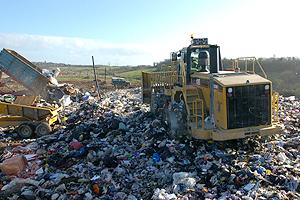Dry recycling and composting of municipal waste grew by 2.58% between 2007/08 and 2008/09 from 31.7% to 34.28%. This was compared to a 4.4% growth in dry recycling and composting rates from 2005/06 to 2006/07 and a 3.26% increase between 2006/07 and 2007/08.
The Scottish Government, which is set to publish its Zero Waste Plan this summer, has set its self ambitious targets for recycling which start with a 40% municipal waste recycling and composting target for 2010, rising to 70% by 2025.
Martin Marsden, head of environmental quality at SEPA, said: “The target to recycle 30% of Scotland's waste was met at the end of 2008, although meeting the 40% target will be more challenging.
“Even greater challenges lie ahead and we must all accept that this will require new and additional services, facilities and, most importantly, changes to our lifestyles so we may further prevent, reuse and recycle our waste in Scotland.”
Concerns
The SEPA comments are not the first acknowledgement that the country may need to step up its efforts to achieve the Zero Waste goals.
In February, the Scottish Government made an additional £7 million in funding available to councils from its Zero Waste Fund in the wake of publishing results for the second quarter of 2009/10 which showed that 14 out of 32 councils were not on course to achieve the goal (see letsrecycle.com story).
Scottish concerns over slowing recycling rates echo similar issues in Wales and Northern Ireland. Welsh data published in March indicated that the country could potentially miss its self-imposed 40% recycling target for 2010 after recording a 37% municipal waste composting and recycling rate for the third quarter of 2009/10 (see letsrecycle.com story).
And, last month, Northern Ireland's third quarter municipal waste management data for 2009/10 showed that both its household and municipal waste recycling rates only increased slightly compared to previous quarters (see letsrecycle.com story).
Study
The Digest is published online and consists of two parts: a ‘key facts' and trends booklet containing tables, graphs and text dealing with high-level trends over the past five years, and a set of tables presenting the detailed annual data.
The publication presents information on waste arisings, recovery, disposal and incineration, and include data on municipal, commercial and industrial wastes. And, they also include a breakdown of what materials each council collects along with information on how much material each local authority collects at the kerbside.
The report was intended to cover the calendar year of 2008 but SEPA explained that it had used data for the 2008/09 financial year where calendar year data on its own was not available.
In total, Scotland produced 19.51 million tonnes of controlled waste in 2008, of which 2.94 million tonnes was classed as household waste. However, a total of 3.29 million tonnes of waste was treated as municipal waste by local authorities.
Of the household waste treated, 1.8 million tonnes was sent for disposal in landfill, 69,000 tonnes was treated via incineration, 661,000 tonnes was recycled and 365,000 tonnes was composted.
The document highlights that eight local authorities recycled or composted more than 40% of their waste, 18 recycled or composted more than 30%, four recycled or composted more than 20% and only two recycled or composted less than 20%. Rates achieved by individual local authorities ranged from 18.6% to 44.9%.
Growth
Breaking down the actual rate of growth in dry recycling and in composting, Scotland has seen a steady increase in both over the past five years.
This is in contrast to England, which has seen the amount of material being sent for composting or anaerobic digestion increase at a much faster rate than that of dry recycling since 2006/07 (see letsrecycle.com story).
SEPA has produced a Waste Data Digest annually since 2001 to present data collected by SEPA on controlled waste in Scotland and provide SEPA's customers with an informative and succinct overview of Scotland's waste management over recent years.












Subscribe for free